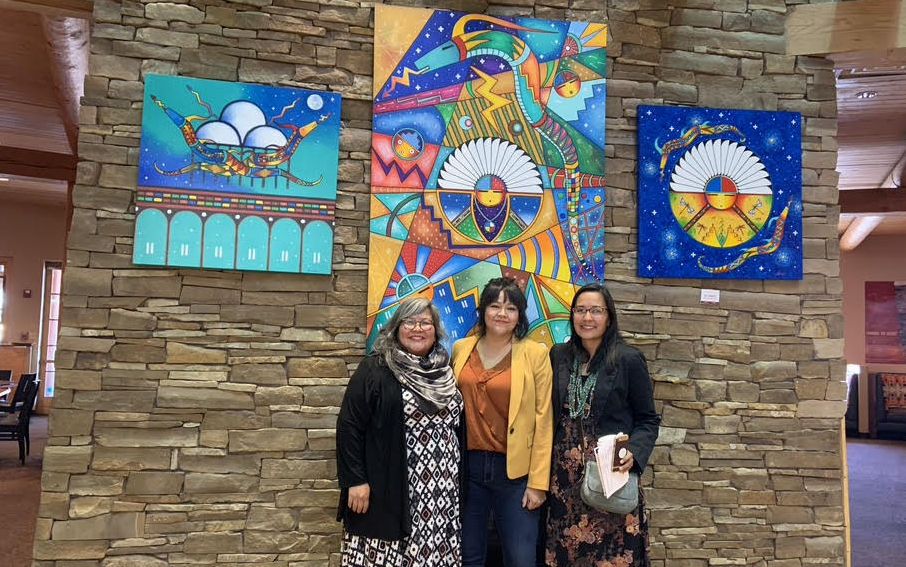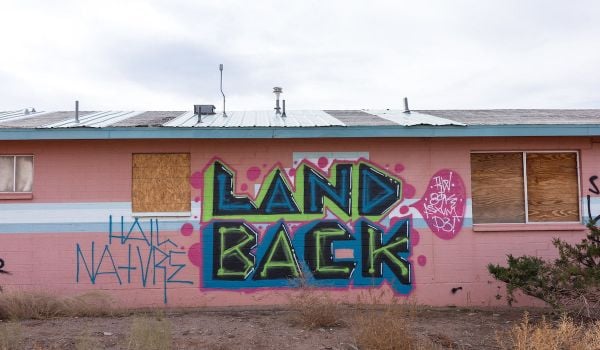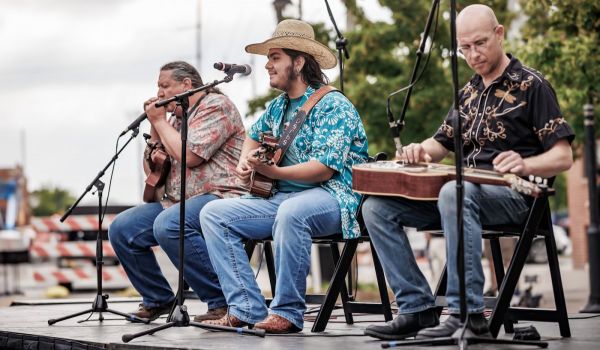EDITOR’S NOTE: This sponsored content is paid for by the Center for Cultural Innovation (CCI), as part of its AmbitioUS initiative. This series explores how alternative economic models can empower artists and culture bearers, with an eye toward financial freedom and long-term sustainability. You can find other stories in this series here.
Vanessa Roanhorse didn’t start with a plan.
When she first moved to New Mexico in 2015 with her husband to raise their newborn son, she’d been living in Chicago for more than a decade. But she wanted to be close to her family and her Navajo community — and, she reasoned, she’d be able to find a job.
A self-described art school dropout, Roanhorse had work experience in a variety of sectors: design, energy, business development. But once she arrived, she struggled. For six months, she says, she lived in her sister’s house, slept on her floor, burned through credit cards. “I was desperate.”
Finally, she landed a contract with the City of Albuquerque, developing the city’s small business resource program alongside a transportation project that was already in progress. She knew she was supposed to separate her personal finances from her business expenses. And so Roanhorse Consulting was born.
“It was a solution for the moment — I had no intention of building my own company,” Roanhorse recalls. “This was just to make sure that I could do my taxes at the end of the year.”
Nowadays, she tells people that she isn’t a “typical entrepreneur.” She didn’t source venture capital or have a business plan. She was just a mother and a wife, trying to make ends meet.
And the experience of starting her own company, Roanhorse adds, was terrible. There was no network of other women, let alone Native women, let alone Native women simultaneously raising a baby and starting a company. Every day, she built initiatives for her city and for small businesses — and still, she felt painfully alone.
“We were talking about resources and capital, but we weren’t talking [about] white supremacy, capitalism and patriarchy: how they keep communities of color, and specifically women of color, out.”
There are 26 federally recognized Indigenous tribes in New Mexico. Native people make up more than ten percent of the state’s population, and reservation lands and pueblos cover a similar percentage of the state; Roanhorse herself grew up on Navajo Nation land. But those numbers were not reflected in the city’s leadership, resources, or beneficiaries.
Roanhorse thought that needed to change. “I decided I wanted to do what I had been doing for the city, but I wanted to do it for my people,” she says.
Five years after starting Roanhorse Consulting, it’s clear she’s succeeded. In partnership with Native Women Lead, an organization Roanhorse founded alongside seven other Indigenous women, the organization has incubated a microfinance character-based lending program with the AmbitioUS-supported Boston Impact Initiative, provided networking opportunities through conferences and events that include the Native Women’s Business Summit, and backed a range of projects led by Indigenous women: tech-enabled mental health platforms, traditional weaving and pottery, comic book creation, ancestral farming practices, and more.
“We focus on entrepreneurship and capital for Indigenous women specifically [because] they are the economic backbone of their families,” Roanhorse explains. “We also know, statistically, that if women have the ability, the agency and the resources, they will make sure their kids eat healthier. They will make sure their kids go to school. They will make sure their kids go to the doctor. That level of care that they are doing for their families is exponential… they are the primary caretakers of our children and our elders, our most vulnerable.”
In matriarchal tribal societies, she says, women have always been both the caretakers and culture bearers. Investment in them is an investment in the entire community.
That investment doesn’t come easily. For years, banking and financial institutions have been riddled with sexism and racism. As a small business owner, Roanhorse has her own horror stories of being dismissed, rejected, patronized, and ignored.
“The reality is that money, capital, investment, have been very traumatic for Native Americans… we were systematically forced to sign treaties that ensured we would never be able to build assets on the lands we were given,” Roanhorse says. That fundamental relationship makes Indigenous wealth-building uniquely difficult; rather than interface with local or state government, sovereign tribes “have to go toe-to-toe with the federal government whenever we’re trying to fix something, change something, ask for more resources.”
“When we talk about access to capital,” she adds, “We’re talking [about] redefining our relationship with money.”
That’s why Native Women Lead and Roanhorse Consulting’s funding process is based not on the five Cs of traditional loan practices (character, capacity, capital, collateral, and conditions), but on relationship-based lending criteria and local engagement. So far, it’s worked; the fund has had zero defaults since its launch.
“It’s about sustainability, long-term investment. Are you giving back to your community, are you hiring locally, are you supporting initiatives and efforts that are more sustainable around Earth Mother?” Roanhorse asks. “Those are things that matter… we’re trying to imagine something different, something that doesn’t [yet] exist.”
As a fund manager, community leader, and business owner, Roanhorse sees the possibilities. She quotes a business report saying that Indigenous women-led businesses — despite being less than one percent of the population — generated $11 billion in revenue in 2017. “That $11 billion happened with no support, no resources, and no tools that actually uplifted these women. Imagine what would happen if we did that with intention?” she asks.
“From my perspective, the sky’s the limit.”
Hannah Chinn is a freelance writer for Next City. She's also a reporter for WHYY News, covering watershed and environmental issues in Philadelphia, PA. Previously, she reported neighborhood news and city planning and policy stories for WHYY’s PlanPhilly.
















